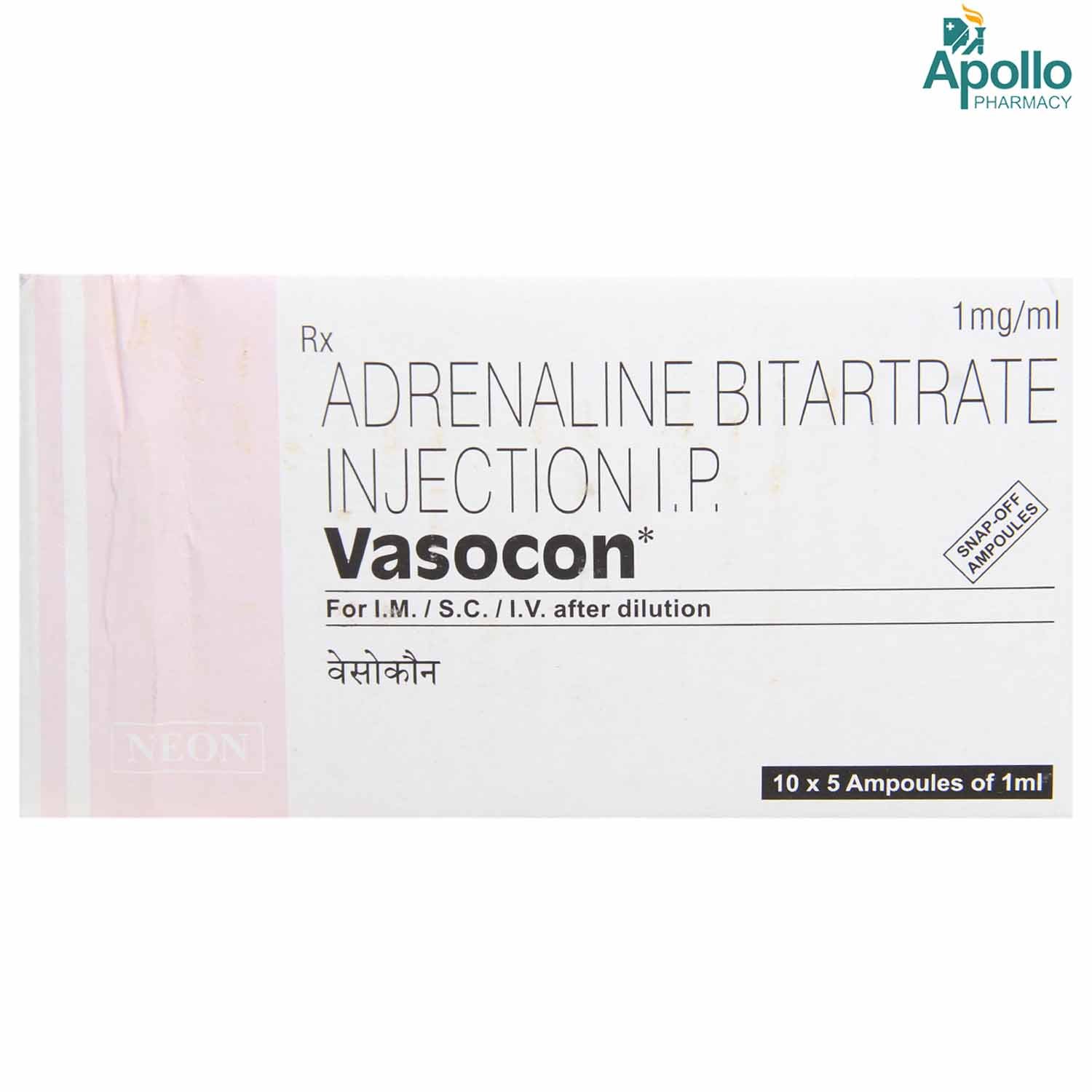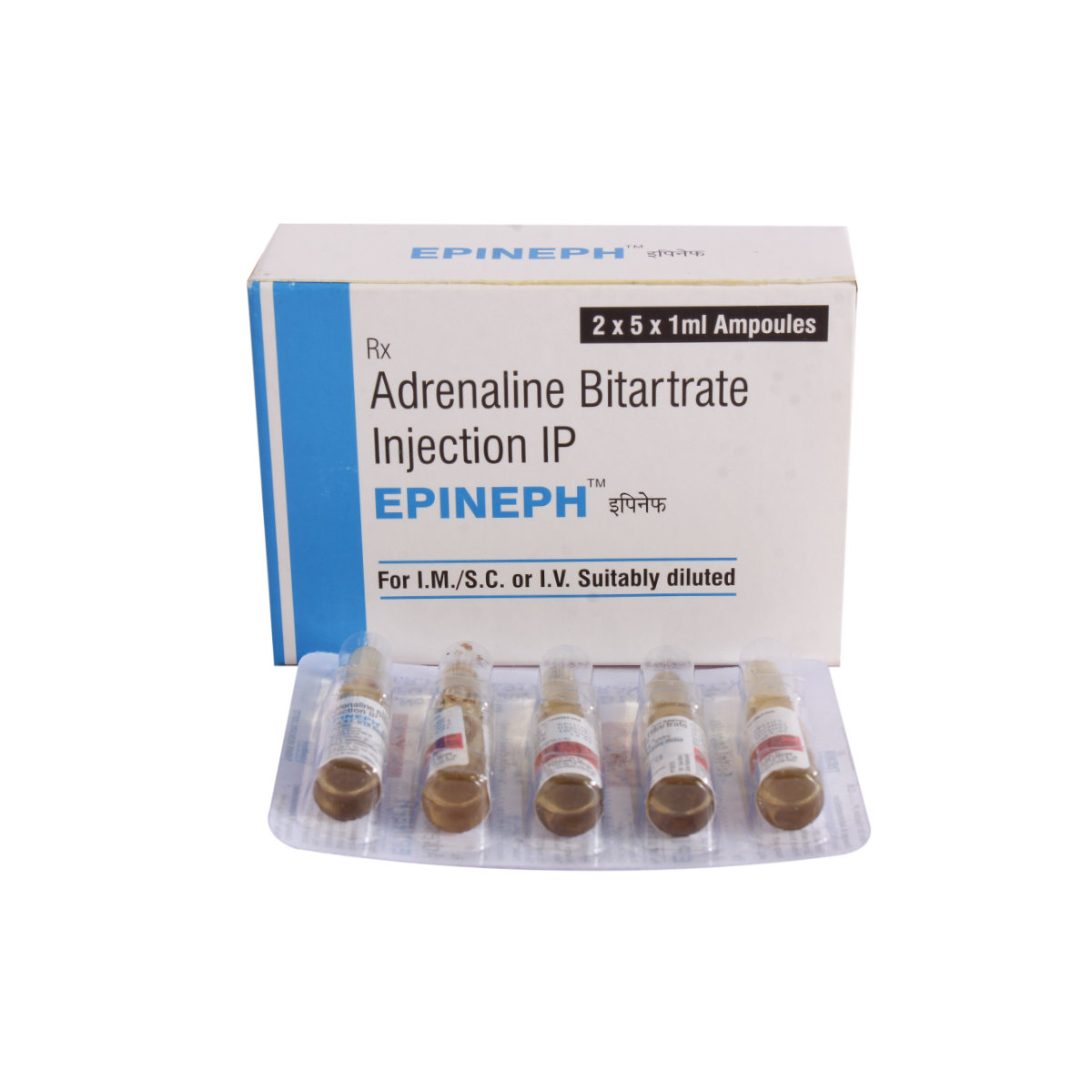- Home
- Adroglare Injection 1 ml
Adroglare Injection 1 ml Substitute
Adroglare Injection 1 ml Substitute
Medicine Composition:
ADRENALINE-1MGAll Substitutes & Brand Comparisons
RX
Out of StockAdrenaline Bitartrate 1 mg Injection 1 ml
Vulcan Laboratories Pvt Ltd
₹12
(₹10.8/ 1ml)
11% CHEAPERRX
Vasocon Injection 1 ml
Neon Laboratories Ltd
₹12.5
(₹11.3/ 1ml)
7% CHEAPERRX
Out of StockRegain Adrenaline Bitartrate Injection 1ml
Regaine Laboratories
₹12.5
(₹11.3/ 1ml)
7% CHEAPERRX
Adenaline Injection 1 ml
Copi Medicare
₹12.5
(₹11.3/ 1ml)
7% CHEAPERRX
Out of StockAdrenaline Bitartrate Injection 1 ml
Themis Medicare Ltd
₹12.5
(₹11.3/ 1ml)
7% CHEAPERRX
Adernaline Inj.1Ml
Ambica Pharma
₹13.5
(₹12.15/ 1ml)
RX
Out of StockAdrenaline Tartrate Injection 1 ml
Harson Laboratories
₹13.5
(₹12.2/ 1ml)
RX
Out of StockAdrush Injection 1 ml
Celon Laboratories Pvt Ltd
₹13.69
(₹12.32/ 1ml)
RX
Out of StockAdrenaline Tartrate Injection 1 ml (Rathi Lab)
Rathi Laboratories (Hindustan) Pvt Ltd
₹14.5
(₹13.05/ 1ml)
6% COSTLIERRX
Out of StockAdrenaline Injection 1 ml
GlaxoSmithKline Pharmaceuticals Ltd
₹15
(₹13.5/ 1ml)
10% COSTLIERRX
Out of StockEpineph Injection 1 ml
Themis Chemicals Ltd
₹16.5
(₹14.85/ 1ml)
21% COSTLIERRX
Out of StockAdren Injection 1ml
Harson Laboratories
₹19
(₹17.1/ 1ml)
40% COSTLIERRX
Out of StockReoline 1 Injection 1 ml
Rathi Laboratories (Hindustan) Pvt Ltd
₹17.25
(₹17.25/ 1ml)
41% COSTLIERRX
Out of StockAdraline Injection 1 ml
Prevego Healthcare & Research Pvt Ltd
₹19.46
(₹17.51/ 1ml)
43% COSTLIERRX
Adrenaline Tartrate Injection 1 ml
Rathi Laboratories (Hindustan) Pvt Ltd
₹128
(₹115.2/ 1ml)
844% COSTLIER

When Should You Consider Switching from Adroglare Injection 1 ml?
Patients may explore substitutes in the following scenarios:
- High monthly cost of Adroglare Injection 1 ml
- Non-availability in local pharmacies
- Generic recommendation by a doctor
- Side effects or better tolerability with alternatives
What to Know Before Switching
Before you switch from Adroglare Injection 1 ml to another medicine, here are some important points to keep in mind:
Same salt, different brands:
Most substitutes contain the same active ingredient - ADRENALINE-1MG, but the fillers, coating, or manufacturing quality may vary slightly.
Consult your doctor first:
Even if the salt is the same, your doctor can confirm if the substitute is right for your condition, dosage, and health history.
Watch out for allergies or reactions:
Some people may react differently to certain brands due to inactive ingredients. If you notice any side effects, inform your doctor immediately.
Price ≠ effectiveness:
A lower-priced substitute doesn't mean it's less effective. Many generic medicines work just as well as branded ones.
Check the dosage form and strength:
Always match the substitute’s strength (e.g., 5mg, 10mg) and form (tablet, capsule, syrup) with what your doctor prescribed.
Uses
Medicinal Benefits
Adroglare Injection 1 ml contains 'adrenaline'; it is also called epinephrine. It belongs to a class of medicines called 'sympathomimetic', primarily taken for the treatment of cardiac arrest, hypotension due to septic shock and life-threatening allergic reactions. Adroglare Injection 1 ml works by increasing blood flow to the heart and also increases the chance of restoring a heartbeat in cardiac arrest. Adroglare Injection 1 ml increases mean arterial blood pressure in adult patients with hypotension associated with septic shock. It is also used to increase blood flow through veins by constricting blood vessels and helps to relax the muscles, which block the airways and allow breathing to return to normal in allergic reactions due to foods, drugs, insect stings or bites or any other allergens. Adroglare Injection 1 ml is also used in the treatment of bradycardia(slow heart rate), mydriasis( dilation of the pupil of the eye) and acute asthma.
FAQs
The substitutes of Adroglare Injection 1 ml contain the same active salt(s) - ADRENALINE-1MG. However, they may differ in price, manufacturing quality, and inactive ingredients. Speak to your doctor to find a suitable option.
Switching to a generic substitute medicine in the place of Adroglare Injection 1 ml is often possible if it has the same salt, strength, and dosage form. But always check with your doctor before making any changes to your medication.
Generics versions of Adroglare Injection 1 ml are typically more affordable because they don’t include the original brand's research, development, and marketing costs. They contain the same active ingredient and are approved for safety and effectiveness.
Most people don’t notice any difference. However, some may react to different fillers or coatings. If you notice any unusual symptoms after switching, consult your doctor.
Make sure the new medicine has the same active salt, strength, dosage form. Always confirm the change with your doctor or pharmacist.
Substitutes of Adroglare Injection 1 ml meet the same safety and efficacy standards as Adroglare Injection 1 ml, but small differences in absorption or formulation can exist. A doctor can help you choose the right one for your needs.
Yes. Substitutes of Adroglare Injection 1 ml may vary in color, size, or shape due to differences in manufacturing and branding, but this does not affect how they work.
Yes, it’s generally safe to switch between multiple substitutes of Adroglare Injection 1 ml if they have the same salt and strength. However, always inform your doctor so they can monitor how your body responds.
Yes, many people safely use substitutes of Adroglare Injection 1 ml for long-term treatment. Just ensure it’s done under medical supervision.
If your symptoms stay under control or lab results remain stable, the substitute for Adroglare Injection 1 ml is likely working well. Regular follow-ups with your doctor are important.
Absolutely. Even with the same salt, small differences can affect how your body responds when switching from Adroglare Injection 1 ml to its substitute. Always consult your doctor before switching.
Buy best Cardiology products by
Torrent Pharmaceuticals Ltd
Sun Pharmaceutical Industries Ltd
Lupin Ltd
Intas Pharmaceuticals Ltd
Cipla Ltd
Micro Labs Ltd
Macleods Pharmaceuticals Ltd
Abbott India Ltd
Ajanta Pharma Ltd
Ipca Laboratories Ltd
Eris Life Sciences Ltd
Mankind Pharma Pvt Ltd
Lloyd Healthcare Pvt Ltd
Dr Reddy's Laboratories Ltd
Glenmark Pharmaceuticals Ltd
Emcure Pharmaceuticals Ltd
Alembic Pharmaceuticals Ltd
Alkem Laboratories Ltd
East West Pharma India Pvt Ltd
USV Pvt Ltd
Zydus Healthcare Ltd
Aristo Pharmaceuticals Pvt Ltd
Elbrit Life Sciences Pvt Ltd
J B Chemicals & Pharmaceuticals Ltd
Zydus Cadila
Akumentis Healthcare Ltd
Alteus Biogenics Pvt Ltd
Hbc Life Sciences Pvt Ltd
Fusion Health Care Pvt Ltd
Troikaa Pharmaceuticals Ltd
La Renon Healthcare Pvt Ltd
Corona Remedies Pvt Ltd
Jubilant Lifesciences Ltd
Medley Pharmaceuticals Ltd
Knoll Healthcare Pvt Ltd
Msn Laboratories Pvt Ltd
Zuventus Healthcare Ltd
Cadila Pharmaceuticals Ltd
Blue Cross Laboratories Pvt Ltd
Lividus Pharmaceuticals Pvt Ltd
Morepen Laboratories Ltd
Ranmarc Labs
Shrrishti Health Care Products Pvt Ltd
Sanofi India Ltd
Steris Healthcare
Elder Pharmaceuticals Ltd
Primus Remedies Pvt Ltd
Unison Pharmaceuticals Pvt Ltd
Eswar Therapeutics Pvt Ltd
Knoll Pharmaceuticals Ltd
Tas Med India Pvt Ltd
Systopic Laboratories Pvt Ltd
Indiabulls Pharmaceuticals Pvt Ltd
Leeford Healthcare Ltd
Sinsan Pharmaceuticals Pvt Ltd
Biochem Pharmaceutical Industries Ltd
Cadila Healthcare Ltd
Azkka Pharmaceuticals Pvt Ltd
Nirvana India Pvt Ltd
Orsim Pharma
Prevego Healthcare & Research Pvt Ltd
Econ Healthcare
Elinor Pharmaceuticals (P) Ltd
FDC Ltd
Sunij Pharma Pvt Ltd
Nicholas Piramal India Ltd
Astra Zeneca Pharma India Ltd
Pfizer Ltd
Lia Life Sciences Pvt Ltd
Shine Pharmaceuticals Ltd
Elicad Pharmaceuticals Pvt Ltd
Indoco Remedies Ltd
Proqol Health Care Pvt Ltd
Vasu Organics Pvt Ltd
Biocon Ltd
Opsis Care Lifesciences Pvt Ltd
Johnlee Pharmaceuticals Pvt Ltd
Merck Ltd
Wockhardt Ltd
Auspharma Pvt Ltd
Ergos Life Sciences Pvt Ltd
Lakshya Life Sciences Pvt Ltd
Ordain Health Care Global Pvt Ltd
Pficus De Med Pvt Ltd
ALICAN PHARMACEUTICAL PVT LTD
RPG Life Sciences Ltd
Glynis Pharmaceuticals Pvt Ltd
Orris Pharmaceuticals
Samarth Life Sciences Pvt Ltd
Aprica Pharmaceuticals Pvt Ltd
Aretaeus Pharmaceuticals Pvt Ltd
Koye Pharmaceuticals Pvt Ltd
Neocardiab Care
Retra Life Science Pvt Ltd
Alniche Life Sciences Pvt Ltd
Alvio Pharmaceuticals Pvt Ltd
Arkas Pharma Pvt Ltd
Atos Lifesciences Pvt Ltd
Divine Savior Pvt Ltd
Metalis Lifesciences Pvt Ltd





